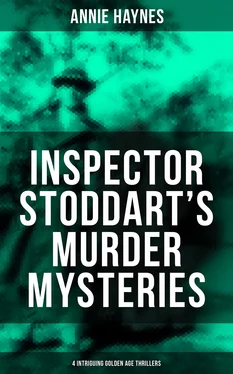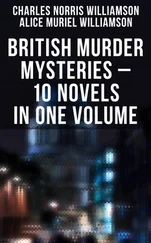"This letter he was writing was to me," the lawyer said pointing downwards.
"Ah, I was coming to that." Stoddart did not turn.
The lawyer read aloud the few words the dead man had written:
"Dear Felix,
"I have been thinking over our conversation and have now decided upon my line of action with regard to the discovery I spoke of. I fancy you know what I meant. But it is, of course, quite possible that I am wrong. The proofs, such as they are, are in my Chinese box. But I shall always maintain—"
Then death had stepped in and the sentence remained unfinished for ever. Skrine's voice trembled as he read it aloud.
The detective was now prowling about near the door leading into the garden. He picked up some tiny fragments of what looked like mud with his tweezers and, after examining them through the magnifying-glass, laid them carefully in the little box in his hand. Then he came over to Skrine.
"You know to what those words refer, I take it, Sir Felix?"
Skrine nodded.
"As is self-evident, to a conversation that we had had that very afternoon."
"Do you think that conversation could in any way help us now?"
"I scarcely think so. It was all so vague really. But you shall judge for yourself. It has appeared to me for some time that Dr. Bastow was not in the best of health. So far, however, he had always evaded the subject when I mentioned it, but yesterday I taxed him with it directly. After beating about the bush for some time he admitted that his sickness was more of the mind than the body. In the course of his professional career he had discovered something connected with a crime that had been committed, and he was undecided what to do about it. He had a very sensitive nature, and it was preying upon his mind. He wanted my advice. I gave it to the best of my ability, not knowing any of the details of the affair, and he seemed inclined to accept it, but said he would see me again before deciding. He is absolutely wrong when he says he thinks I know what he meant. I should imagine from this letter"—tapping it as it lay on the table—"that he had made his decision before consulting me any further."
The detective looked at the paper then back again at Skrine standing behind the vacant chair.
"What does he mean by his Chinese box? We had better have that."
Skrine looked round vaguely.
"I take it he meant a box that generally used to stand on the table before him with gold dragons sprinkled over a red lacquer background—that sort of thing, don't you know. I don't see it now."
"It isn't here," said the detective quickly. "But perhaps he put it in some place of safety. How big a box was it?"
Sir Felix looked doubtful.
"Oh, about so big, I should say," holding his hands about a foot apart.
The detective nodded.
"It would go in the safe, then. We must search for it there. But first, Sir Felix, I must ask if you really had no idea of the nature of the discovery he had made, or why it was troubling him?"
"Really no knowledge whatever. But naturally one makes surmises—especially in a profession like mine. It is almost unavoidable."
"Of course." The detective looked puzzled. "But I am sure you appreciate the importance of this as well as, if not much better than I do, Sir Felix. Do you connect this secret of the doctor's with his murder?"
"N—o," Sir Felix said slowly. "Not if it is as I surmise. I really don't see that it could have any connexion with his death."
"You feel sure that you don't know the cause of the worry of which Dr. Bastow was speaking to you?"
"No, I don't," Sir Felix said bluntly. "I really feel sure of nothing."
The detective rubbed the side of his nose reflectively.
"I think you will have to tell us the nature of the secret, Sir Felix, or rather of what you surmise the nature to have been. I know you realize the importance of placing every detail in the hands of the police," he added.
Sir Felix did not hesitate.
"Certainly. The only stipulation I make is that I do not speak until your examination of the household is complete."
The inspector did not look satisfied. Had the man to whom he was speaking been almost anyone else, he would have insisted on a full disclosure at once, but Sir Felix Skrine was no ordinary person to him.
"Very well, Sir Felix," he said grudgingly at last. "But now I must ask you something else. Can you tell me the names of any men among Dr. Bastow's friends or acquaintances who wear dark beards?"
"Dark beards!" Sir Felix looked amazed at the question. "There may have been dozens. I don't know."
"But can you remember the names of any of them?" the detective persisted.
Sir Felix raised his eyebrows.
"Not at the moment. Yet stay—there is Dr. Sanford Morris, noted for his research work, and John Lavery, an old schoolfellow of ours. He lives near Lancaster Gate, but I don't think Dr. Bastow saw much of him; though I have met him here on special occasions—anniversaries, etc. I believe they both have dark beards, but why do you ask?"
"I will show you, Sir Felix, though, mind you, I shall say nothing about it to anyone else at present." The detective drew a sheet of notepaper from the blotting-book before the dead man's chair; across it was scrawled in big, bold handwriting—like that of the half-finished letter Skrine had just been studying—
"It was the Man with the Dark Beard."
"What do you think of that, Sir Felix?" Sir Felix stared at the paper in astonishment.
"It is Dr. Bastow's writing. But what does it mean?" he inquired at last.
The detective shook his head.
"I don't know. I can't see how the words could refer to the murder or the murderer. Even if the doctor recognized him death was instantaneous. And yet I can't help fancying that they do refer to the murderer."
"I don't see how they can," Sir Felix dissented still in the same perplexed tone. "And there are heaps of men with dark beards—"
"You could only remember two just now," remarked the detective.
"Not at the moment. But I don't know all Dr. Bastow's acquaintances or patients."
"Of course not," the detective assented. "But these two you have mentioned. One is a doctor engaged in the same sort of work as Dr. Bastow, you said. The other—Mr. Lavery—what is he?"
"He is in Somerset House, the Estate Duties Office," Sir Felix replied. "Still, as I say, I have seen little of him for years. But neither of these men could have had anything to do with the murder."
"Well, we can't be sure of anything," the detective returned dogmatically. "I will just finish in this room, and then we will see the household." Magnifying-glass in hand he went back to the window. Sir Felix followed him.
"What are you doing here? I think it is pretty well established that the murderer entered by the garden door. Footprints and fingerprints you find here will be those of Mr. Wilton, who broke this window to get in."
"Precisely," the inspector returned dryly. "But I am not looking for prints of any kind at the present moment, Sir Felix. I was just wondering how this curtain and blind could have been arranged so that anyone in the garden could see into the room. It seems to me that it could only have been done purposely."
Sir Felix looked at him.
"Do you mean that anyone outside could see into this room—that they witnessed the murder?"
Inspector Stoddart went on arranging the curtain, pulling it back, twisting it to one side.
"I don't know what anybody witnessed, Sir Felix. I shouldn't be surprised if it was—just that! What I want to know is—was it purposely arranged? And if so why was it arranged for this particular night?"
Sir Felix passed his hand over his forehead wearily.
"I can't understand what you are talking about. Why do you imagine that anyone saw anything through this window?"
Читать дальше












